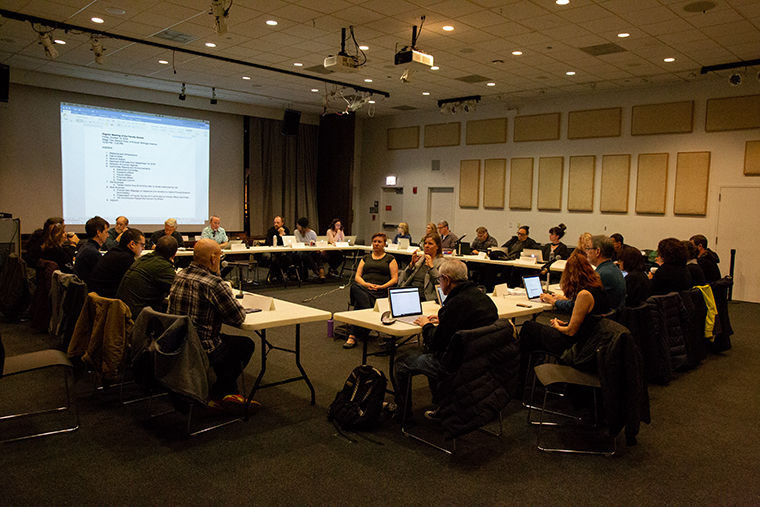‘Cloud of uncertainty’ looms over Faculty Senate meeting
October 16, 2018
Columbia faculty can expect more cuts to compensation and benefits, including an impending cut of total compensation of about $1,000 this year for family health care benefits.
President of the Faculty Senate and Associate Professor in the Humanities, History and Social Science Department Sean Andrews informed senators of the benefits cost increases during the Oct. 12 Faculty Senate meeting held at Stage Two, 618 S. Michigan Ave.
Columbia employees had already been informed by mail of a new schedule of benefits but the increase in costs for families was not highlighted and faculty had told their senators that they didn’t realize just how much more they would have to pay for health care.
The news was not received well by senators who pointed out that they haven’t received a cost of living adjustment in 10 or 15 years.
Associate Professor in the Science and Mathematics Department and Vice President of Faculty Senate Keith Kostecka called for an immediate and dramatic change in faculty compensation, including an across the board cost of living increase.
“A good number of people feel full-time faculty need to be better compensated for these salary cuts that have been occurring,” Kostecka said. “We need action as soon as possible.”
Among the proposed changes is a phased retirement plan, a task force will convene Oct. 23 to discuss the issue with the goal of wrapping up discussions by December and having possible administrative action by the end of the 2018-2019 academic year, Kostecka said.
Faculty survey results for 2018 showed faculty were very dissatisfied with faculty financial opportunities and salaries at the college. Chair of the Faculty Affairs Committee and Associate Professor in the Interactive Arts and Media Department Dave Gerding presented the survey results during the meeting.
“We shouldn’t be treating this as a chess piece, and that’s why we’re sober about the analytics,” Gerding said.
Among the wide-ranging survey topics, results indicated 63 percent of the 191 respondents agreed that committee work at the college contributes to improving student experience, and 37 percent disagreed. Thirty-one percent of respondents agreed the college supports their scholastic endeavors, including time, finances and space. Fifty-six percent of respondents reported they are satisfied with the college’s parental leave policies.
However, only 39 percent of respondents agreed their current salary is appropriate. Only 16 percent of respondents agreed that their salary adjustments for cost of living are adequate. Twenty-four percent of respondents reported being dissatisfied with the administration’s implementation of policies.
In other senate activity, co-directors of the Academic Diversity, Equity and Inclusion office, Associate Professor in the Dance Department Raquel Monroe and Associate Professor in the Art and Art History Department Fo Wilson, updated senators on their current and future goals for DEI.
At the top of DEI’s list is increasing grant opportunities for faculty. DEI hopes to create a grant of up to $1,000 to be used for programming opportunities for faculty, such as bringing in classroom speakers. DEI is also exploring outside grants for diversity training of Columbia faculty, Monroe said.
“Moving forward in this time of austerity, we were trying to think, how can we extend the benefits of the [diversity] training to students?” Wilson said.
In the future, DEI will focus on representation, not only in who is hired at the college, but also in the research faculty members are conducting, Monroe said.
Andrews also brought to senators’ attention President and CEO Kwang-WuKim’s postponement of his decision whether or not to discontinue the creative arts therapies and early childhood education programs.
“This process itself has nearly fatally stalled program enrollment, perhaps making the recommendation for discontinuance a self-fulfilling prophecy,” Andrews said. “Neither program was particularly pleased with the postponed decision. They’ve already weathered several semesters of uncertainty.”








